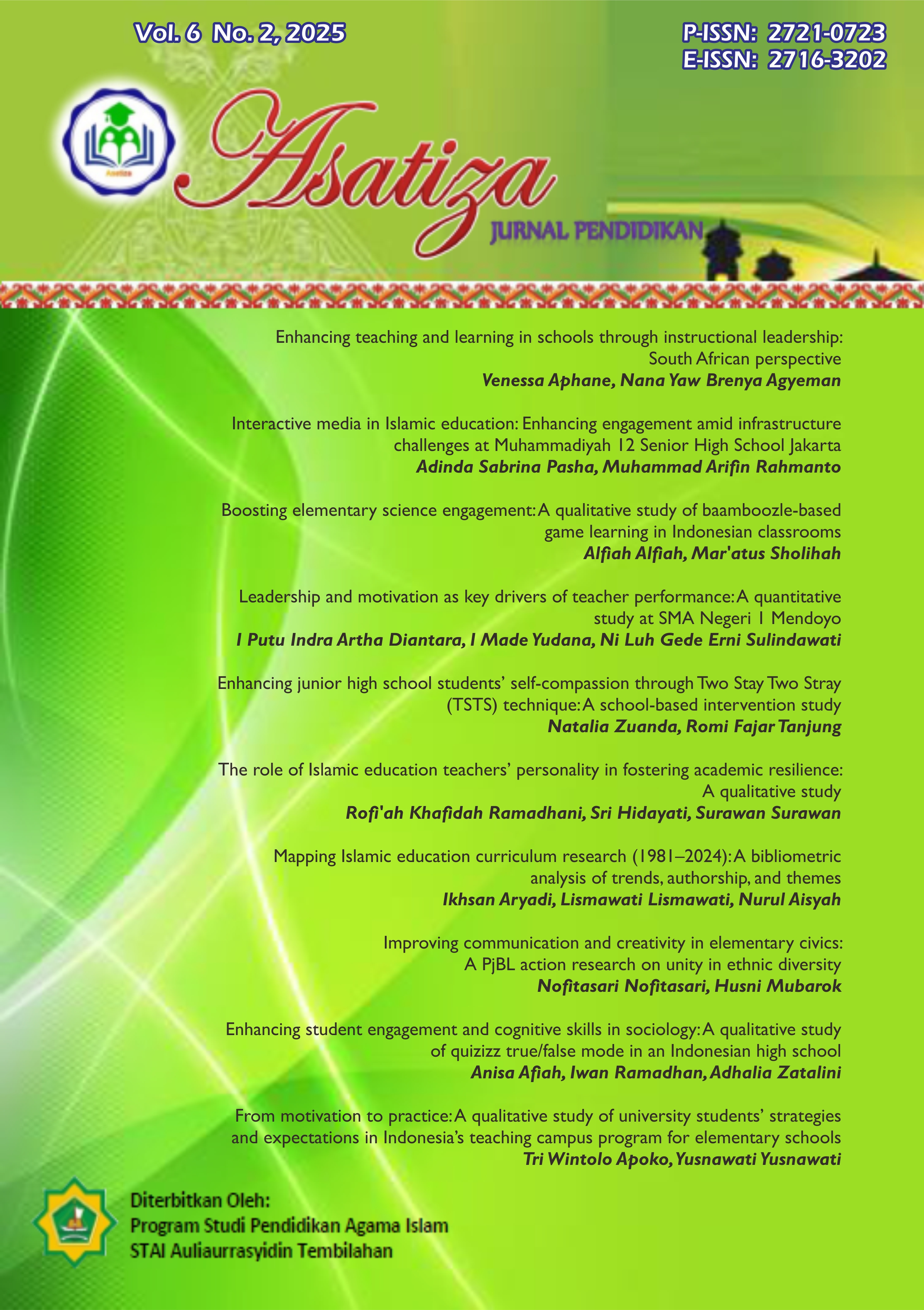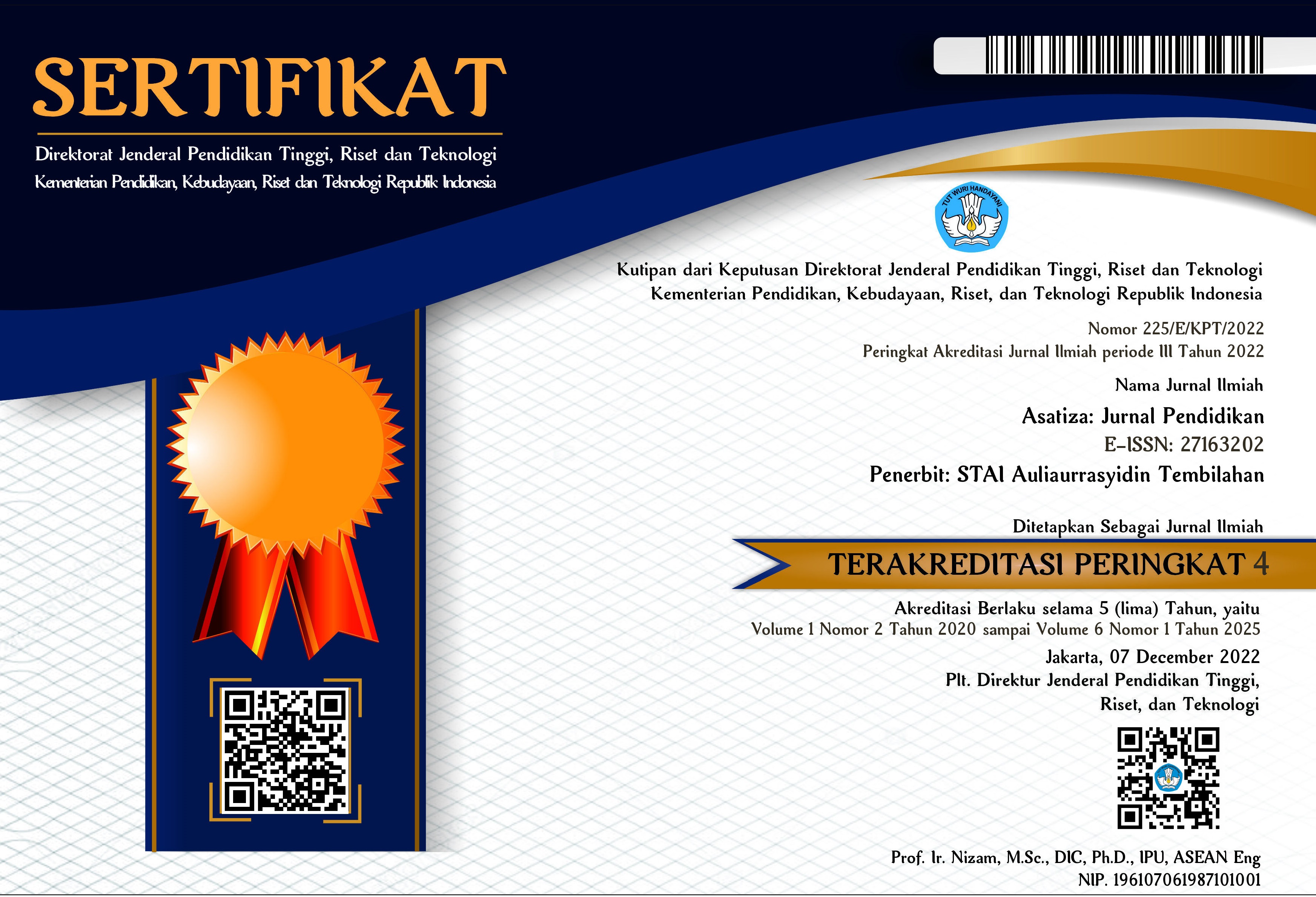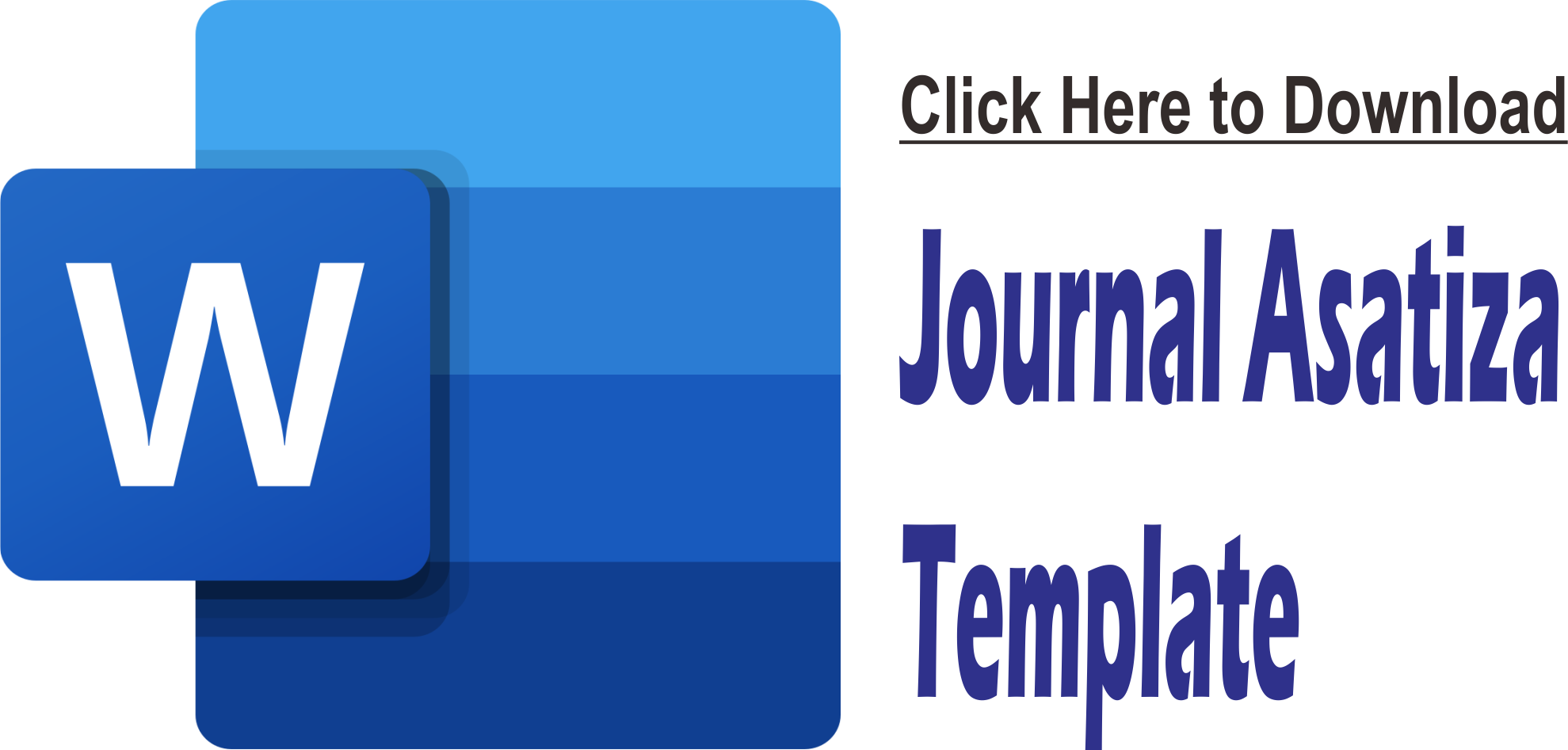Enhancing teaching and learning in schools through instructional leadership: South African perspective
DOI:
https://doi.org/10.46963/asatiza.v6i2.2261Keywords:
Instructional Leadership, Education Quality, South African SchoolsAbstract
This qualitative case study examines instructional leadership's role in enhancing education quality in South African schools, where persistent learner underperformance reflects systemic challenges. Despite the Department of Basic Education’s reports highlighting widespread underperformance, limited research explores how school leaders address these issues. Focusing on a public secondary school, the study purposively sampled eight school leaders, employing semi-structured interviews to gather data. Thematic analysis revealed that effective instructional leadership strengthens curriculum alignment and resource allocation, with principals serving as pivotal actors. However, gaps persist in leadership practices, necessitating targeted improvements. Key strategies include adopting learner-centered pedagogies, fostering teacher autonomy, and cultivating supportive learning environments. The findings underscore the urgency of prioritizing instructional leadership to mitigate systemic inefficiencies and improve knowledge acquisition. This study contributes to the discourse on educational leadership in low-performing contexts, advocating for policy and practice reforms to address South Africa’s declining education outcomes.
Downloads
References
Agasisti, T., Bowers, A. J., & Soncin, M. (2018). School principals' leadership types and student achievement from a three-step latent class analysis: Empirical results from a three-step latent class analysis. Educational Management Administration and Leadership, 1-27. https://doi.org/10.1177/17411432241231902
Agyeman, N.Y. & Aphane, V. (2024). Exploring school leadership styles used to improve instruction and learning in schools. Journal of Research Initiatives. 8(3). 1-28. https://digitalcommons.uncfsu.edu/jri.
Allsop, D. B., Chelladurai, J. M., Kimball, E. R., Marks, L. D., & Hendricks, J. J. (2022). Qualitative methods with NVivo software: A practical guide for analysing qualitative data. Psych, 4(2), 142-159. https://doi.org/10.3390/psych4020013
Alshenqeeti, H. (2014). Interviewing as a data collection method: A critical review. English Linguistic Research, 3(1), 1-8. https://doi.org/10.5430/elr.v3n1p39
Anderson, M. (2016). Transformational leadership in education: A review of existing literature. International Social Science Review, 93(1), 1-60. https://doi.org/10.24940/theijbm/2023/v11/i2/BM2302-016
Angell, B. D. (2017). Transformational innovation and Transformational Leadership in the US Government Department of Defense Acquisitions Workforce. Capella University.
Archer, E. (2018). Qualitative data analysis: A primer on core approaches. University of Western Cape.
Asimiran, I., Kadir, N. A., & Basri, M. (2020). The role of school leadership in enhancing student achievement in developing countries: A systematic review. Journal of Educational Administration, 48(3), 321-342. https://doi.org/10.51629/ijeamal.v1i2.10
Banach, M. H. (2015). Instructional leadership and deliberate practice: A framework for improving student achievement. Loyola University Chicago. Theses and Dissertations, 1-87. https://scholarworks.sfasu.edu/slr/vol15/iss1/13
Bhengu, T. T., & Myende, P. E. (2016). Leadership for coping with and adapting to policy change in deprived contexts: Lessons from principals. South African Journal of Education, 36(4), 1-10. https://doi.org/10.15700/saje.v36n4a1322
Brolund, L. (2016). Student success through instructional leadership. BU Journal of Graduate Studies in Education. 8(2). 1-4. https://eric.ed.gov/?id=EJ1230490
Chetenio, P., & Shindika, E. S. (2017). Ethical leadership in South Africa and Botswana. BAR Brazilian Administration Review, 14(2), 1-19. https://doi.org/10.1590/1807- 7692bar2017160077
Cooray, P.S. (2023). School culture and leadership. Technical Report. 1-37. https://www.researchgate.net/publication/371639809
DBE. (2016). School leadership and Management in South Africa: Findings from a systematic literature review. Department of Education Gazette: Zanex Foundation Journal, 1-54. https://eric.ed.gov/?id=EJ1093208
Hallinger, P. (2005). Instructional leadership and the school principal: A passing fancy that refuses to fade away. Leadership and policy in schools, 4(3), 221-239. https://doi.org/10.1080/15700760500244793
Hayak, M., Avidov-Ungar, O. & Bitton, I. (2024). Circles of support for teacher leadership implementing innovations at school: Point of view of teachers and school principals. Leadership and Policy in Schools. 1-16. https://doi.org/10.1080/15700763.2024.2327574
He, P, Guo, F. & Abazie G.A. (2024). School principals' instructional leadership as a predictor of teachers' professional development. Asian Pacific Journal of Second and Foreign Language Education. 9(63). 1-18. https://doi.org/10.1186/s40862-024-00290-0
Hompashe, D. (2018). Instructional leadership and academic performance: Eastern Cape educators' perceptions and quantitative evidence. Stellenbosch Economic, 1-37. https://www.ekon.sun.ac.za/wpapers/2018/wp132018
Hortat, H. (2023). Emerging and near-future challenges of higher education in East Asia. Asian Economic Policy Review. 18(1). 171-191. https://doi.org/10.1111/aepr.12416
Htut, M. H. (2018). The impact of effective leadership styles on employee performance in NGOS: A study of Myanmar, the Red Cross Society. Lincoln University, pp. 1-14. https://doi.org/10.13140/RG.2.2.24206.64327
Khan, A. A., Asimiran, A., Kadir, S. A., & Basri, R. (2020). Principal instructional leadership practices in Pakistan elementary schools: Perceptions and implications. Social and Behavioural Sciences, 8(1a), 16-23. https://doi.org/10.13189/ujer.2020.081303
Khumalo, S. S. (2019). Exploring the leadership practices of primary school principals through transformational leadership: A selected case in Limpopo Province, South Africa. Journal of Gender, Information and Development in Africa (JGIDA), 8(2), 21-38. https://doi.org/10.31920/2050-4284/2019/8n3a2
Kilag, O.K. & Sasan, J.M. (2023). Unpacking the role of instructional leadership in teacher professional development. Advanced Qualitative Research. 1(1). 1-12. https://doi.org/10.31098/aqr.v1i1.1380
Liebowitz, D. D., & Porter, L. (2019). The effect of principal behaviours on student-teacher outcomes: A systematic review and meta-analysis of the principal literature. University of Oregon, 1-62. https://doi.org/10.3102/0034654319866133
Lombo, N & Subban, M. (2024). Physical infrastructure challenges in rural schools. Reflections to promote quality education. Administratio Publica. 22(1). 1-33. https://journals.co.za/doi/pdf/10.10520/ejc-adminpub_v32_n1_a6
Lumadi, R. I. (2017). Ensuring educational leadership in the creation and leadership of schools. KOERS-Bulletin for Christian Scholarship, 82(3), 1-6. https://doi.org/10.17159/2520-9868/i69a11
Mahon, B.M. and Sembiante, S.F. (2020). Re-envisioning the purpose of early warning systems: Shifting the mindset from student identification to meaningful prediction and intervention. Review of Education. 8(1). 266-301. https://doi.org/10.1002/rev3.3183
Mestry, R. (2017). Empowering principals to lead and manage public schools effectively in the 21st century. South African Journal of Education, 37(1), 11. https://doi.org/10.15700/saje.v37n1a1334
Mestry, R. (2017). Principals' perspectives and experiences of their instructional leadership function to enhance learner achievement in public schools. Journal of Education, 258(69), 1-24. https://doi.org/10.17159/2520-9868/i69a11
Mncube, D.W., Ajani, O.A. & Gugu, . M. (2023). Exploring the problems of limited school resources in rural schools. UMT Education Review. 6(2). 1-31. https://doi.org/10.32350/UER.62.01
Munna, A. S. (2023). Instructional leadership and role of module leaders. International Journal of Educational Reform, 32(1), 38-54. https://doi.org/10.1177/10567879211042321
Musewere, M., Jita, L. & Chimbi, G. (2024). School inspectors' perspectives on their instructional leadership support to schools in Zimbabwe. South African Journal of Education. 44(3). 1-12. https://doi.org/10.15700/saje.v44n3a2409
Muthumuni, V. M. & Mokoena, S. (2024). Challenges in practising instructional leadership: Insights from selected technical and vocational education and training (TVET) colleges in South Africa. International Journal of Learning, Teaching and Educational Research. 23(5). 107-120. https://doi.org/10.26803/ijlter.23.5.6.
Namutebi, E. (2019). Instructional leadership and lecturers' job performance in public universities in Uganda. East African School of Higher Educational Studies & Development, 10(2), 93-118. https://doi.org/10.4314/majohe.v10i2.8
Naz, F., & Rashid, S. (2021). Effective instructional leadership can enhance teachers’ motivation and improve students’ learning outcomes. sjesr, 4(1), 477-485. https://doi.org/10.36902/sjesr-vol4-iss1-2021(477-485)
Ng, D. (2019). Instructional Leadership. Nanyang Technological University. 1-44. http://dx.doi.org/10.1007/978-3-319-74746-0_2
Nowell, L S; Norris, J M; White, D E; Moules, N J; (2017). Thematic analysis: Striving to meet the trustworthiness criteria. International Journal of Qualitative Methods, 16, 1-13. https://doi.org/10.1177/1609406917733847
Sanchez, R. D., Carvajal, A. L. P., Molano, R. R., Amihan, S. R., Valdez, J. V., Sanchez, R. V., ... & Gonzales, R. D. (2024). Leading from within: Nurturing leadership skills and service mindset of educators. ETCOR Educational Research Center Research Consultancy Services.
Sarros, J. C., Cooper, B. K., & Santora, C. C. (2016). Building a climate for innovation through transformational leadership and organizational culture. Journal of Leadership & Organizational Studies, 15(2), 145-158. https://doi.org/10.1177/1548051808324100
Shava, G. N., & Tlou, F. N. (2018). Principal leadership and school improvement: Experiences from South African school contexts. International Journal of Innovative and Applied Research, 6(12), 1-11. http://www.journalijiar.com
Tan, C. Y. (2016). Examining school leadership effects on student achievement: The role of contextual challenges and constraints. Cambridge Journal of Education, 1-26. https://doi.org/10.1080/0305764X.2016.1221885
Toprak, M. (2020). Education leadership: A systematic review. International Journal of Educational Administration, Management, and Leadership. 1(2). 85-96. https://doi.org/10.51629/ijeamal.v1i2.10
Truong, T. D., & Hallinger, P. (2107). Exploring cultural context and school leadership: Conceptualising an Indigenous Co-uy school leadership model in Vietnam. International Journal of Leadership in Education. Theory and Practice, 20(5), 539-561. https://doi.org/10.1080/13603124.2015.1105388
Turkoglu, M. E., & Cansoy, R. (2018). Instructional leadership behaviours according to perceptions of school principals in Turkey. International Online Journal of Educational Sciences, 10(5), 36-53. https://doi.org/10.15345/iojes.2018.05.003
Zickafoose, A., Ilesanmi, O., Diaz-Manrique, M & Adeyemi, A.E. (2024). Barriers and challenges affecting quality education (Sustainable Development Goal #4) in Sub-Saharan Africa by 2030. Sustainability. 16(2657). 1-17. https://doi.org/10.3390/su16072657
Downloads
Published
Issue
Section
License
Copyright (c) 2025 Venessa Aphane, Nana Yaw Brenya Agyeman

This work is licensed under a Creative Commons Attribution-ShareAlike 4.0 International License.
Authors who publish with this journal agree to the following terms:
1. Copyright on any article is retained by the author(s).
2. The author grants the journal, right of first publication with the work simultaneously licensed under a Creative Commons Attribution shareAlike 4.0 International License that allows others to share the work with an acknowledgment of the work’s authorship and initial publication in this journal.
3. Authors are able to enter into separate, additional contractual arrangements for the non-exclusive distribution of the journal’s published version of the work (e.g., post it to an institutional repository or publish it in a book), with an acknowledgment of its initial publication in this journal.
4. Authors are permitted and encouraged to post their work online (e.g., in institutional repositories or on their website) prior to and during the submission process, as it can lead to productive exchanges, as well as earlier and greater citation of published work.
5. The article and any associated published material is distributed under the Creative Commons Attribution-ShareAlike 4.0 International License











2.png)



